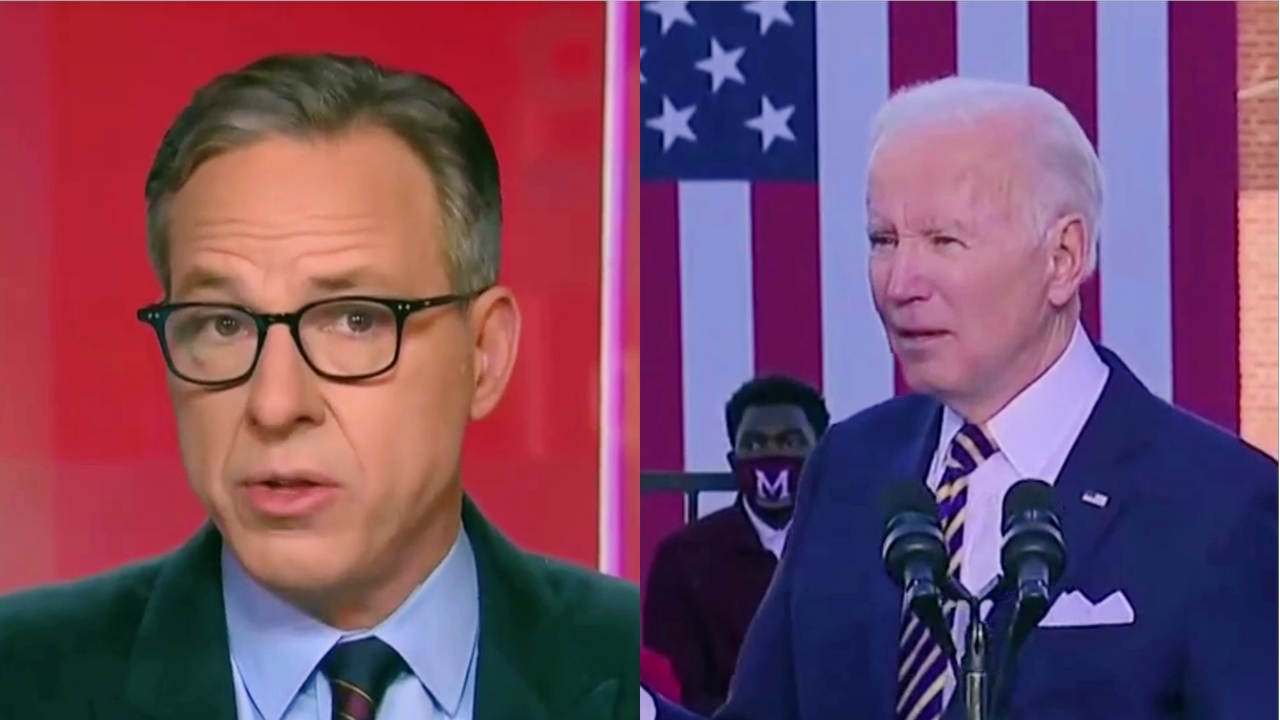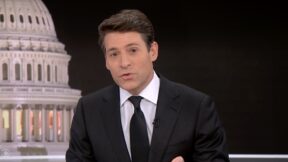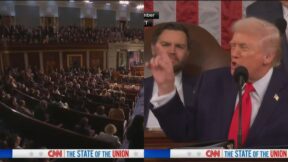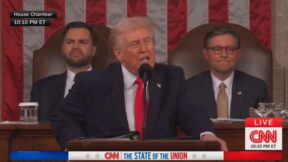Jake Tapper’s Dishonest Hand-Wringing About Biden’s Voting Rights Speech Puts Him on the Side of Bull Connor

CNN’s Jake Tapper has spent days clutching his pearls about the “stark” tone of President Joe Biden’s voting rights speech, ironically placing him in the moral sewer whose invocation so offends him.
It’s not just Tapper. Almost all of the political news media have covered themselves in shame following the speech in one way or another. If they’re not fanning themselves over the “harsh” tone and potential offense given to members of the Senate, they’re treating the push for voting rights as if it were a game.
If I had a nickel for every political reporter who wondered what the “political risk” is should Biden take a stand and be obstructed, I’d put the nickels in a sock and beat them with it.
(Editor’s note: Mr. Christopher is joking and will not be beating anyone with a sock full of nickels.)
But Tapper is particularly disappointing for the dishonesty he has brought to the exercise, the privilege he has displayed in doing so, and the influence he wields with his colleagues.
That group includes me. Tapper and I covered President Barack Obama’s White House at the same time, and then, as now, he prided himself on a reputation for objectivity that translated to an ability to infuriate or delight either side of the political spectrum in equal measure. Although we frequently disagreed, it was something I admired him for, and it built him a reservoir of credibility that served him well after Donald Trump got elected.
So it was particularly galling to see Tapper’s immediate reaction to the speech, which featured audible astonishment at the president’s most compelling illustration of the stakes involved.
As Biden was still walking off the stage, Tapper turned to Jeff Zeleny to say “And, Jeff, President Biden depicted this struggle — which is about two pieces of legislation and a major controversial change to the Senate rules — in very stark terms. Martin Luther King versus segregationist King George Wallace, Abraham Lincoln or president of the confederacy, Jefferson Davis!”
Don’t set aside the disgusting framing of a centuries-long struggle against discrimination as being about two bills and a Senate rule, because it’s crucial to the rest of Tapper’s schtick, wherein he literally laughed as he described the historical touchstones the president cited.
And don’t forget that seconds after that speech, with all of its power and the weight of history behind it, Tapper’s first question was “Will that language work convincing the skeptics on his own side he needs to convince like Joe Manchin and Kyrsten Sinema of Arizona?”
That ethos carried over to his Wednesday interview with Senator Dick Durbin, during which Tapper succeeded at the easiest tasks in the world: getting a Democrat to undermine a Democratic president.
To set the table, here’s the portion of the president’s speech that so disturbed Tapper — and many others in the media.
And here’s one thing every senator and every American should remember: History has never been kind to those who have sided with voter suppression over voters’ rights. And it will be even less kind for those who side with election subversion.
So, I ask every elected official in America: How do you want to be remembered?
At consequential moments in history, they present a choice: Do you want to be the si- — on the side of Dr. King or George Wallace? Do you want to be on the side of John Lewis or Bull Connor? Do you want to be on the side of Abraham Lincoln or Jefferson Davis?
This is the moment to decide to defend our elections, to defend our democracy.
And so, in order to extract a whimpering “maybe the president went too far” from Durbin, Tapper referenced that section of the speech with supreme smugness and dishonesty:
But you’re comparing or Biden is comparing and you’re not criticizing, the idea of a legislator reducing the number of days for early voting from 15 to 10 or wanting voters to present a photo ID before they vote. You’re comparing that to Bull Connor who literally set dogs upon civil rights protesters. George Wallace who said segregation today, segregation forever — I’m paraphrasing. Or Jefferson Davis, the president of the traitorous Confederacy.
I mean, isn’t that a little stark?
Yes, Durbin should have shoved that right back in Tapper’s face, with mustard. He should have pointed out that the entire point of that passage was to be stark — justifiably. C’est la vie.
And Tapper can no longer retreat behind the cloak of being just a guy asking questions after he spent the Trump years making it clear that he had no compunction about moralizing when the subject was something he really cared about. This was a choice, and his visceral reaction following the speech underscores that. This is what Tapper really thinks.
So allow me to correct my colleague on a few things.
Number one: The struggle for voting rights is not “about two pieces of legislation and a major controversial change to the Senate rules,” it is a struggle that goes back hundreds of years and has been waged with the blood of countless heroes.
Number two: The current wave of voter restrictions that voting rights advocates are fighting does not consist of “a legislator reducing the number of days for early voting from 15 to 10 or wanting voters to present a photo ID before they vote.”
Tapper knows this, and if he needs a refresher, Jen Psaki gave one a few days ago.
And that’s just a drop in the bucket, according to The Brennan Center:
Between January 1 and December 7, at least 19 states passed 34 laws restricting access to voting. More than 440 bills with provisions that restrict voting access have been introduced in 49 states in the 2021 legislative sessions. These numbers are extraordinary: state legislatures enacted far more restrictive voting laws in 2021 than in any year since the Brennan Center began tracking voting legislation in 2011. More than a third of all restrictive voting laws enacted since then were passed this year. And in a new trend this year, legislators introduced bills to allow partisan actors to interfere with election processes or even reject election results entirely.
And most importantly, number 3: President Biden was NOT comparing people like Joe Manchin or Kyrsten Sinema with the likes of Bull Connor and George Wallace and Jefferson Davis. To hear Tapper say so shocks the conscience because he must know better, he simply must.
“Compare” is a word that gets misused and overused in politics. Not every invocation is a comparison. President Biden was not saying or even implying that opponents of filibuster reform and/or voting rights bills are the same as Bull Connor, or even that they are substantially similar to any of the historical villains Biden cited. And Jake Tapper simply has to know this.
What the president was saying, explicitly and implicitly, is that no matter the explanation or motivation, history will remember only two sides, and those who do not support one side are necessarily aiding the other. To put it another way, to do nothing in the face of a threat is to aid that threat.
Or to put it yet another way, I’ll turn things over to Jake Tapper for a second:
“Bad men need nothing more to compass their ends, than that good men should look on and do nothing.”
— John Stuart Mill https://t.co/7Vz2fAQLSP
— Jake Tapper (@jaketapper) March 30, 2021
Is Tapper saying the security guards are literally the same as the man conducting the attack, or even similar, or even that they share the man’s sentiments in any respect? That’s not how I took it, but I suppose that’s how Jake Tapper would take it if Joe Biden said it.
In making this dishonest argument, Tapper has unfortunately placed himself on the wrong side of history, just as those who failed to oppose the Bull Connors and Jefferson Davises and George Wallaces did.
But worse than that, Tapper has provided aid and comfort to the enemies of voting rights by at best shifting the focus onto the hurt feelings of the (perhaps well-meaning) obstructionists that have always existed at these moments in our history — the ones who weren’t racist, just concerned about states rights or maybe totally supported civil rights thought those negroes would accomplish more if they weren’t so angry all the time.
At worst, Tapper has recast the debate over voting rights in trivial terms, and used his considerable credibility and influence to promote a ready-made excuse for “good men” to “look on and do nothing.”
Again, it’s not just Tapper, but he’s a lot more influential than other media figures, and I expected more of him because he has so frequently demonstrated a grasp of the consequences of ignoring historical echoes.
Shame on him.
This is an opinion piece. The views expressed in this article are those of just the author.
New: The Mediaite One-Sheet "Newsletter of Newsletters"
Your daily summary and analysis of what the many, many media newsletters are saying and reporting. Subscribe now!






Comments
↓ Scroll down for comments ↓